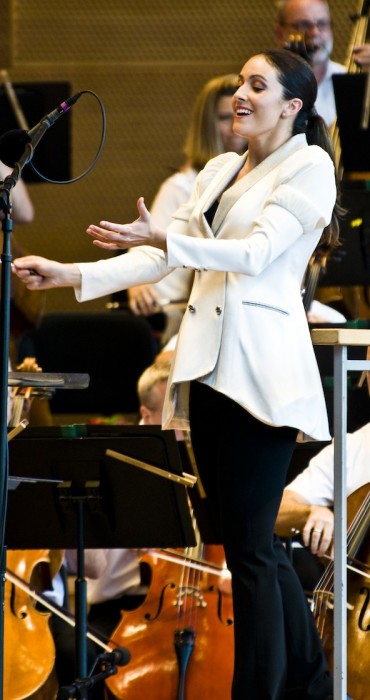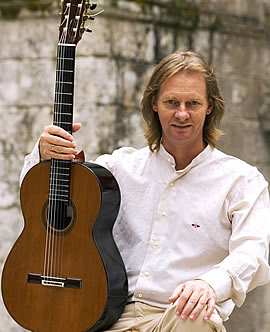de la Parra offers a U.S. premiere in mixed program with Grant Park Orchestra

With Carlos Kalmar out of town for the middle weeks of the Grant Park Music Festival season, it’s the traditional time for several guest conductors to take the podium at the Pritzker Pavilion.
On Friday night Alondra de la Parra made her lakefront festival debut. Last year, in her first Chicago appearance, the Mexican conductor made an impressive showing with the Chicago Sinfonietta, putting her on the short list for Sinfonietta music director, a post that ultimately went to Mei-Ann Chen.
In a lightish program of music nicely suited to summer listening, de la Parra had more mixed success Friday — admirable in the lighter Latin works and showing a lack of seasoning and interpretive depth in the concluding Dvorak symphony.
De La Parra has been a committed ambassador for her country’s music. In her recording debut last year, she released Mi alma Mexicana, a two-disc set on Sony that makes an excellent introduction to Mexican classical music.
In the same vein, de la Parra brought a U.S. premiere to Chicago Friday, Leyenda de Miliano by Arturo Marquez, one of Mexico’s leading composers.
Written for the 2010 bicentennial of Mexico’s independence and the centennial of Mexico’s revolution, the conductor premiered the work last year in Cuernavaca with the Philharmonic Orchestra of the Americas, the New York-based ensemble she founded in 2004 at age 23.
Leyenda de Miliano pays tribute to Emilio Zapata, hero of the revolution and champion of the Mexican underclass. While no specific program is indicated, the 13-minute work opens with a driving rhythmic theme that suggests Zapata’s folkloric popularity in its brassy heroic style. The relentless rhythmic counterpoint is rather unvaried and metrical at times, though Marquez mixes things up with splashes of local color, as with a muted trumpet solo and contrasting romantic episodes. Near the end a loping theme with an oddly Yiddish feel to it comes galumphing in sounding like a satiric take on Zapata’s enemies and/or the government, which leads to a brassy chord and a final shimmer of violins.
Leyenda de Miliano may not be a masterpiece but it’s an attractive and smartly orchestrated work, making enjoyable enough summer fare. De la Parra and the Grant Park musicians provided colorful and vibrant advocacy.

Few works are as well-suited to al fresco music-making as Joaquin Rodrigo’s Concierto de Aranjuez. Soloist David Russell, who has been building an impressive discography on the Telarc label, showed himself fully in synch with the Spanish composer’s colorful guitar concerto.
Born in Scotland and long resident in Spain, Russell took a properly intimate view of the concerto. With notably fluent articulation, the opening movement was aptly spirited, without being inflated. One jarring slip apart, Russell’s gently nuanced playing conveyed the languid nocturnal expression of the famous Adagio, aided by Judith Kulb’s evocative English horn.
As usual, the final movement was an anticlimactic letdown after the inspired music that precedes it, with its banal main theme and throwaway coda. Rodrigo’s fault not the soloist’s, though Russell made as worthy a case as possible. De la Parra’s scaled down accompaniment was vivacious and lightly sprung, providing fine support.
The second half of the program fared less well. As Andrew Grams showed on Wednesday night, some new conductors thrive on the lakefront festival’s short rehearsal time, managing to put together an exhilarating performance while working with the Grant Park Orchestra for the first time.
The performance of Dvorak’s Symphony No. 7 led by de la Parra Friday night, however, proved merely competent without being in any way individual or distinctive.
For Dvorak’s leanest and toughest symphony, her direction was oddly soft-edged and over-cultivated, lacking an essential thrust and dramatic bite. The conductor moulded string phrases with a loving legato but didn’t really display an idiomatic Dvorak style or seem in synch with the symphony’s darker elements. The first movement was oddly tepid, and while the middle movements proved more successful, the performance overall was wanting in forward impetus. Balances seemed off, with the brass strangely held back in the final movement, not cutting through string textures until the coda.
The program will be repeated 7:30 p.m. Saturday at the Pritzker Pavilion. Admission is free. grantparkmusicfestival.com
Posted in Performances





Posted Jul 10, 2011 at 1:47 am by Guillermo Munoz
“As usual, the final movement was an anticlimactic letdown after the inspired music that precedes it, with its banal main theme and throwaway coda.”???
Please, learn more about music before making such remarks.